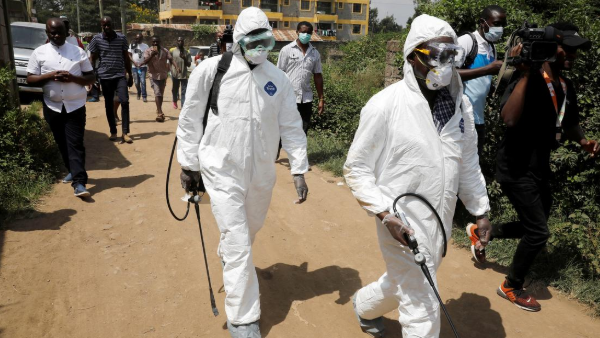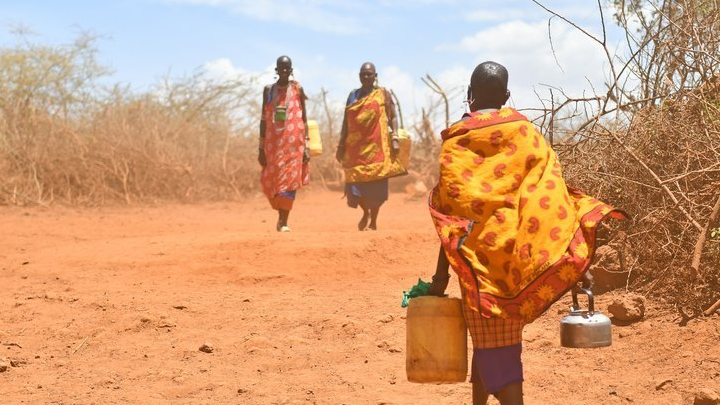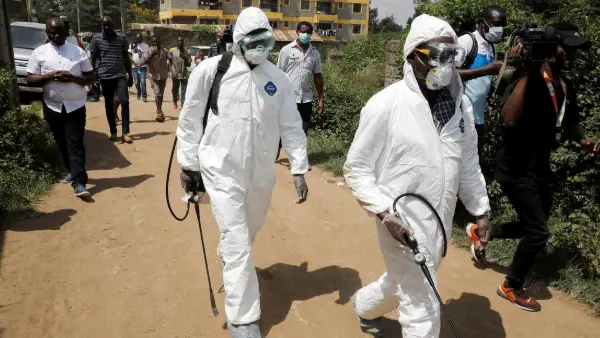
Kenyan health workers dressed in protective suits walk after disinfecting the residence, Kenya March 14, 2020. /Reuters
**Editor's note: **Hamzah Rifaat Hussain is a former visiting fellow at the Stimson Center in Washington, and currently serves as assistant researcher at the Islamabad Policy Research Institute (IPRI) in Pakistan. The article reflects the author's opinions and not necessarily the views of CGTN.
Scientists, journalists and Western observershave labeled the presence of COVID-19 in Africa as a "time-ticking"bomb with the Guardian economics editor, Larry Elliot coming up with a gross generalizationwhere "rich countries”have to realize that Africa's looming crisis will eventually be theirs. Such assertions blur the reality of a continent, which despite grappling with severe socioeconomic issues and communicable diseases prior to the pandemic, is striving hard to implement strict measures on a large scale.
The United Nations Food Agency recently negotiated a humanitarian corridor to keep food aid flowing in Africa as nations across the continent have closed borders to curb the spread of the COVID-19pandemic.
These measures along with social distancing are integral towards flattening the curve. Owning the crisis is less about time ticking bombs and the rich having a responsibility to cater for the poor and more about understanding the dynamics that define Africa at this point in time.
The continent's primary concern amid the COVID-19 pandemic is food securityparticularly in the south of the continent. Southern Africa is currently undergoing a period of severe drought with nearly 45 million people being vulnerableto severe food shortages. One of the most prosperous countries in the region, South Africa, has agreed to send vesselscarrying food aid for states such as Zimbabwe, Malawi, Botswana and Namibia and has also gained positive press coverage for implementing a nationwide lockdownwith violators being penalized severely.
The impact of drought on Africa is independent of narratives of pervasive corruptionas an impediment towards implementing strict policy measures or curbing the pandemic.The continent has witnessed deaths of virologists, scientists and sports stars,which is a similar trend in other regions.
However, mainstream narratives depict African countries such as Burundi for being less transparentwith little emphasis placed on the measures that these resource-deprived countries have undertaken.
In times when positive developments need to be highlighted for hope and breakthroughs from this pandemic, there are several advantages that go to Africa's benefit and credit.

A Maasai woman carries water at Olomayiana West, Kajiado County, Kenya, February 15, 2017. /Xinhua
Firstly, the continent has already been at the center of the Ebola outbreak of 2014 and implemented coercive measuresin curbing and largely confining the outbreak to its shores to its credit. The presence of a large HIV infected population in countries such as Botswana and South Africa along with malaria in Nigeria and Kenyaalso gives Africa significant infrastructural support in dealing with outbreaks and communicable diseases.
The continent's healthcare system while severely compromised and resource strained requires assistance yet COVID-19 has demonstrated that even countries with comprehensive healthcare systems can suffer from mass casualties and capacity issues.
The virus has also attacked the continent at a later stage unlike other regions, such as Europe, which is an added advantage for African authorities in fighting the pandemic.
Respective governments were quick to recognize the presence of cases resulting in measures such as immediate flight suspensions, closures of educational institutesand disinfection drives. The continent's tech ecosystem was equally quick to respondto presence of the virus and limited quarantine measures were implemented at an early stage.
These are significant achievements and advantages that need to be acknowledged alongside traditional narratives of poor health infrastructures and lack of access to clean drinking water as points of concern.
Currently, Europe and the United States are considered epicentersof the pandemic and African states have so far reported fewer deathsdespite large segments of impoverished populations reeling from HIV and mass poverty. Sweeping judgments passed by the global scientific community fails to factor in current statistics and promotes alarmist narratives which could prove detrimental to ongoing efforts.
Along with food insecurity two other issues are of utmost importance as Africa confronts COVID-19. The continent is home to some of the world's deadliest conflicts with terrorist groups such as Al Shabaab in Somalia and Boko Haram in Nigeria posing a significant security threat. Up north in Libya, the conflict between Khalifa Haftar's factions and the Grand National Alliancethreatens to derail efforts against COVID-19 on its shores.
Many of the continent's problems regarding the COVID-19 pandemic are subject to developments globally as well, with a continuous fall in oil prices having a direct impact on oil producing countries such as Libya, Equatorial Guinea, Gabon, Algeria and Nigeria.
Oil prices plummeting will deprive African states from key sources of income to sustain their economies and this coupled with food insecurity would be more severe for the continent than its current health predicaments.
That said, the COVID-19 outbreak in Africa is definitely a concern. Yet, blanket narratives in such sensitive times runs the risk of failing to appreciate measures undertaken by the resource-strained continent.
The key focus for the international community should be directed at addressing food shortages and monitoring current lockdown measures instead of claiming blatantly that the presence of COVID-19 on the continent is a death sentence for the globe.
(If you want to contribute and have specific expertise, please contact us at [email protected])
 简体中文
简体中文





